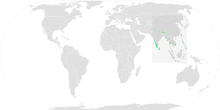Besra
| Besra | |
|---|---|
 | |
| Female besra in Ankola, Karnataka, India | |
| Scientific classification | |
| Kingdom: | Animalia |
| Phylum: | Chordata |
| Class: | Aves |
| Order: | Accipitriformes |
| Family: | Accipitridae |
| Genus: | Accipiter |
| Species: | A. virgatus |
| Binomial name | |
| Accipiter virgatus Temminck, 1822 | |
 | |
| Global range Year-Round Range Summer Range Winter Range | |
The besra (Accipiter virgatus) is a bird of prey in the family Accipitridae.
The besra is a widespread resident breeder in dense forests throughout southern Asia, ranging from the Indian subcontinent eastwards across Southeast Asia and into East Asia. It nests in trees, building a new nest each year. It lays 2 to 5 eggs.
This bird is a medium-sized raptor (29 to 36 cm) with short broad wings and a long tail, both adaptations to fast manoeuvring. The normal flight of this species is a characteristic "flap–flap–glide", and the barred underwings are a distinction from the shikra, A. badius.
This species is like a darker version of the widespread shikra, but all plumages have a dark vertical throat stripe. The adult male besra has dark blue-grey upperparts, and is white, barred reddish below. The larger female is browner above than the male. The juvenile is dark brown above and white, barred with brown below. It has a barred tail.
In winter, the besra will emerge into more open woodland including savannah and cultivation. Its hunting technique is similar to other small hawks such as the sparrowhawk and the sharp-shinned hawk, relying on surprise as it flies from a hidden perch or flicks over a bush to catch its prey unaware.
The prey is lizards, dragonflies, and small birds and mammals.
References
- ↑ BirdLife International (2012). "Accipiter virgatus". IUCN Red List of Threatened Species. Version 2013.2. International Union for Conservation of Nature. Retrieved 26 November 2013.
- Birds of India by Grimmett, Inskipp and Inskipp, ISBN 0-691-04910-6
